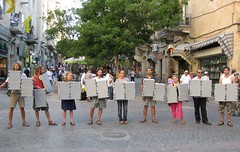In case you’re not a Jerusalemite, the Bezalel art school is for anybody who is anybody who is a beatnik. A creative, funny, politically active beatnik. The kind you want at your potluck.
While strolling Ben Yehuda Street in downtown Jerusalem a few days ago, I came upon a chain of Bezalel folks doing this:
In a horizontal line, they each held a gray box that represented a brick in the wall between Israel and Palestine. The purpose of the art demo: to engage the Israeli public in conversation about the latest concrete structure between Israel and the West Bank that stirs disagreement among all facets of Israeli society.
For those who wanted to join the chain of artists, there was an additional pile of gray boxes stacked next to a nearby bench. The power of the installation was made evident by a teenage girl who stomped on the pile until it flattened. What struck me most about the girl was not her disapproval of the installation, but her degree of political certainty for such a young age. Off to the side, a project organizer explained that whether one believes the wall is a security essential or a government attempt to occupy more land, whether one comes from the right or the left, the conversation must become more public.
Leave it to the art students to find ironic ways of being heard: as part of the installation, the demonstrators were instructed to not speak a word to pedestrians who engaged with them. In the end their silence allowed engaged Jerusalemites to debate the wall with each other while the art students watched. Let’s keep talking about it, I say.
Posted By Rachel Brown
Posted Jun 20th, 2009



3 Comments
Erin
June 22, 2009
I often tell people that I chose to become a literature professor because I believe in the power of the written word to educate both the mind and the heart–an education of the sympathies–and I believe in the things that happen when people read, and write about what they read, and have conversations about what they have read and written. The books themselves don’t change anything–it’s all about how we allow ourselves to be changed by them. I think that’s the purpose and value of art, and I think that’s part of what you’re describing in this post.
(PS: I want YOU at my potluck.)
Rachel Brown
June 23, 2009
Amen, Erin! I’m hoping to profile the work of artists/animators/poets, etc. that inspire as the summer goes on. On this note, for those who haven’t heard of Suheir Hammad, she is a fantastic poet from Palestine/Brooklyn. Hearing her words are what first interested me in the conflict and prompted me to ask why I had never before been exposed to the Palestinian narrative. Check her out!
Erin
June 26, 2009
Thanks for pointing to this poet. Her work might make an interesting conversation with another poet’s, Hamutal Bar-Yosef. She visited and read at the college where I taught last semester, and she made quite an impact on me and my students. Her work is written in Hebrew but available in translation, and hearing her read the same poem in both languages was a powerful lesson in the relationship between sound and sense.
(In particular, she read one poem called “Bubble Gum” about two young girls–one Israeli, one Palestinian–encountering one another from opposite sides of a barrier fence, that reminds me of your burping contest story in some ways…I’ll try to find it for you.)